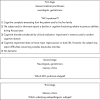Mild cognitive impairment (MCI) in medical practice: a critical review of the concept and new diagnostic procedure. Report of the MCI Working Group of the European Consortium on Alzheimer's Disease
- PMID: 16549412
- PMCID: PMC2077456
- DOI: 10.1136/jnnp.2005.085332
Mild cognitive impairment (MCI) in medical practice: a critical review of the concept and new diagnostic procedure. Report of the MCI Working Group of the European Consortium on Alzheimer's Disease
Abstract
Mild cognitive impairment (MCI) was proposed as a nosological entity referring to elderly people with mild cognitive deficit but no dementia. MCI is a heterogeneous clinical entity with multiple sources of heterogeneity. The concept of MCI was reviewed and a diagnostic procedure with three different stages was proposed by the European Consortium on Alzheimer's Disease Working Group on MCI. Firstly, MCI should correspond to cognitive complaints coming from the patients or their families; the reporting of a relative decline in cognitive functioning during the past year by a patient or informant; cognitive disorders as evidenced by clinical evaluation; absence of major repercussions on daily life; and absence of dementia. These criteria, similar to those defined during an international workshop in Stockholm, make it possible to identify an MCI syndrome, which is the first stage of the diagnostic procedure. Secondly, subtypes of MCI had to be recognised. Finally, the aetiopathogenic subtype could be identified. Identifying patients at a high risk for progression to dementia and establishing more specific and adapted therapeutic strategies at an early stage, together with more structured overall management, is made possible by the diagnostic procedure proposed.
Conflict of interest statement
Competing interests: None declared.
References
Publication types
MeSH terms
LinkOut - more resources
Full Text Sources
Other Literature Sources
Medical
Miscellaneous

